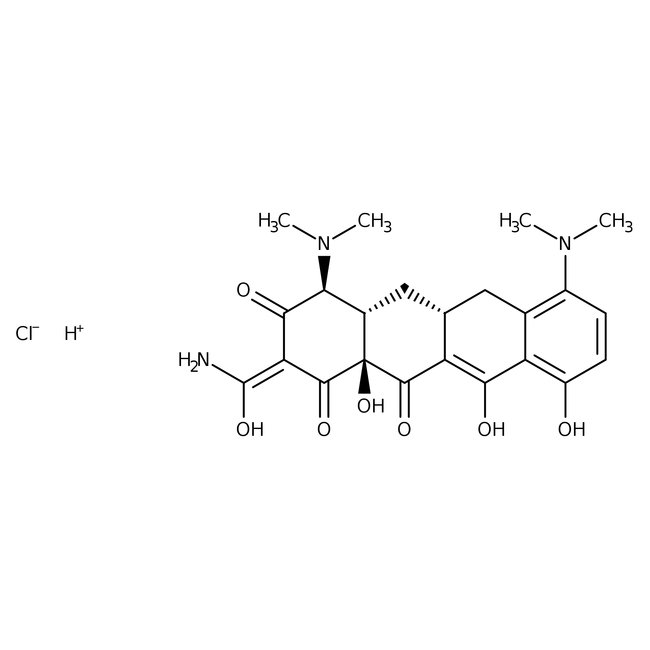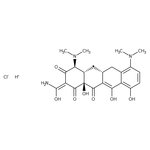Search Thermo Fisher Scientific
Minocycline hydrochloride, 97%
| Catalog Number | Quantity |
|---|---|
| FSA455330010 | 1 g |
General Description
• Minocycline hydrochloride is the hydrochloride salt of minocycline, a broad spectrum long-acting derivative of the antibiotic tetracycline, with antibacterial and anti-inflammatory activities
• This compound exerts its action by binding to the bacterial 30S ribosomal subunit and interfering with the binding of tRNA to the ribosomal complex, resulting in the inhibition of protein translation in bacteria
• Minocycline hydrochloride can inhibit the inflammatory enzyme 5-lipoxygenase (5LOX) and may block T cell-microglia interactions. 5LOX catalyzes the synthesis of inflammatory mediators, including prostaglandins and leukotrienes. Therefore, both molecular activities described may contribute to minocycline's neuroprotective activity.
Applications
• This compound is effective against tetracycline-resistant Staphylococcus cultures • Minocycline hydrochloride inhibits lipopolysaccharide mediated inflammatory cytokine tumor necrosis factor (TNF-α) secretion by macrophages
• It inhibits endothelial cell proliferation and angiogenesis in vitro through the translational suppression of HIF-1α
• This compound exhibits anti-tumor activity in glioma by inhibiting membrane type 1 matrix metalloproteinase
General References:
- Liu, D.; Yang, P.S. Minocycline hydrochloride nanoliposomes inhibit the production of TNF-α in LPS-stimulated macrophages. Int J Nanomedicine. 2012, 7, 4769-75.
- Jung, H.J.; Seo, I.: Jha, B.K.; Suh, S.I.; Suh, M.H.; Baek, W.K. Minocycline inhibits angiogenesis in vitro through the translational suppression of HIF-1α. Arch Biochem Biophys. 2014, 545, 74-82.
- Afshari, A.R.; Mollazadeh, H.; Sahebkar, A. Minocycline in Treating Glioblastoma Multiforme: Far beyond a Conventional Antibiotic. J Oncol. 2020, 8659802.
- Garrido-Mesa, N.; Zarzuelo, A.; Gálvez, J. Minocycline: far beyond an antibiotic. Br J Pharmacol. 2013, 169 (2), 337-52.
- Romero-Miguel, D.; Lamanna-Rama, N.; Casquero-Veiga, M.; Gómez-Rangel, V.; Desco, M.; Soto-Montenegro, M. Minocycline in neurodegenerative and psychiatric diseases: An update. Eur J Neurol. 2021, 28 (3), 1056-1081.
- Pfaller, M.; Rhomberg, P.; Huband, M.; Flamm, R. Activities of Omadacycline and Comparator Agents against Staphylococcus aureus Isolates from a Surveillance Program Conducted in North America and Europe. Antimicrob Agents Chemother. 2017, 23, 61 (3), e02411-0216.



